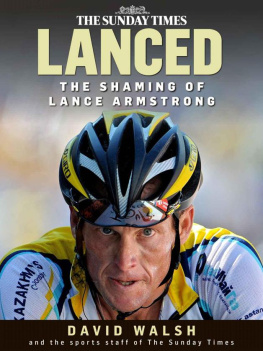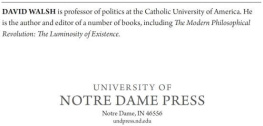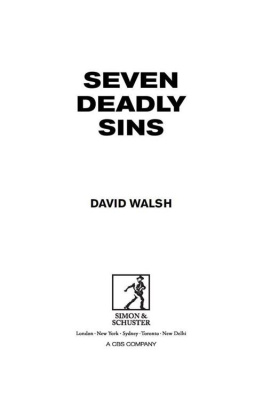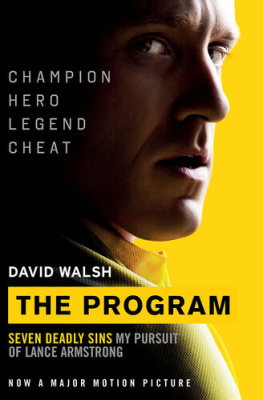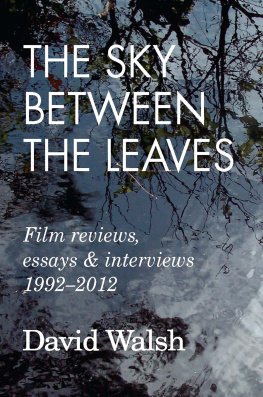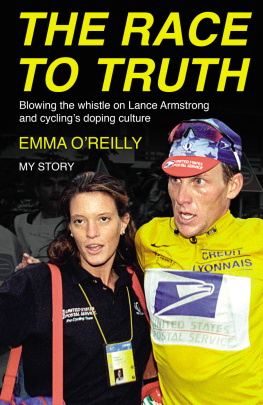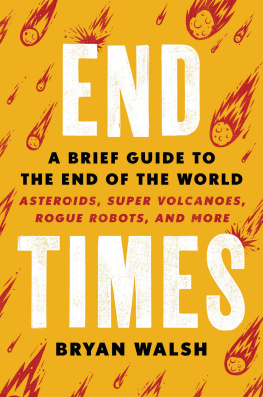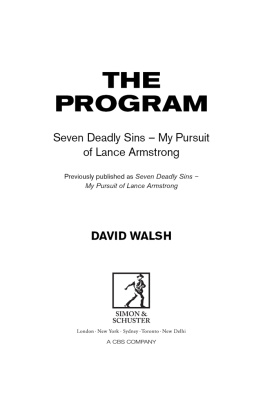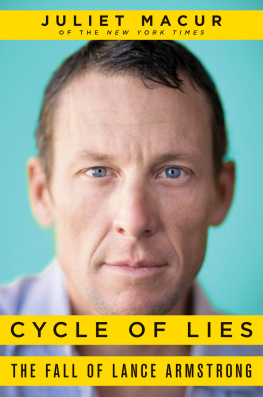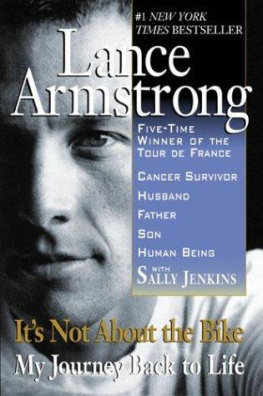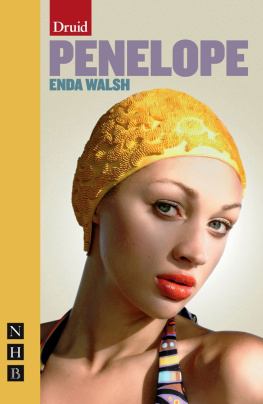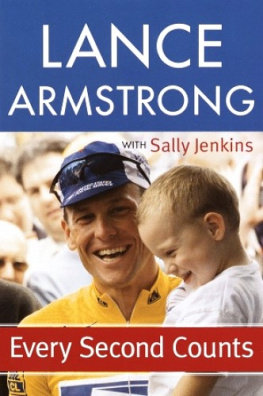
LANCED
The shaming of Lance Armstrong
Copyright Times Newspapers Ltd 2012
All rights reserved, not to be copied or reproduced without permission
Contents
Foreword
One line sticks out in all the many thousands of words written about Lance Armstrong. It was a quote from Greg LeMond, the first American winner indeed, now officially the only American winner of the Tour de France.
Talking about Armstrongs recovery from cancer to win the race, he said: If Lance is clean, it is the greatest comeback in the history of sport. If he isnt, it would be the greatest fraud.
LeMond spoke those words in 2001 but it was only this year that Armstrong was unmasked as one of sports most notorious cheats. That he was finally brought to justice was in no small part the result of the tireless efforts of David Walsh, the chief sports writer of The Sunday Times.
As this collection reveals, Walsh knew something wasnt right about Armstrongs amazing recovery from cancer as early as 1999, when the Texan won his first Tour (all his seven consecutive victories have now been expunged from the record books). That year was supposed to be about redeeming the race after the drug busts of the previous year, but, incredibly, Armstrong was riding the race faster than the drug-assisted competitors of previous years.
Walsh was one of the few journalists who dared to doubt the miracle of the cancer survivor who had come back nearly from the dead to win arguably the toughest race in sport. As the years went by, the other reporters largely melted away, feeling that if they could not tell the truth about the race and its winner, they didnt want to write anything about it at all.
Walsh, however, persisted, exposing Armstrongs links to Michele Ferrari, a disgraced doping doctor, and gradually piecing together evidence of Armstrongs guilt, through first-hand testimony from those who had witnessed him taking performance-enhancing drugs.
The combination of Armstrongs hold over the sport of cycling and Britains libel laws was to prove costly for The Sunday Times. The newspaper was sued for libel by Armstrong after we published a report (reprinted here with the headline 'LA confidential') about a new book by Walsh and a French journalist. The case was eventually settled for a six-figure sum, although The Sunday Times is now taking steps to recover the money spent in damages and legal fees.
Here we present Walshs articles, and a number written by other colleagues on The Sunday Times. They show the tenacity with which the newspaper pursued Armstrong and the drug cheats. Of course, they are of their time, and should be taken as historical documents, recording the best of our knowledge on any particular date.
As a whole, they represent some of the finest investigative reporting in British journalism in recent times.
Alex Butler, Sports Editor, The Sunday Times
November 2012
Riding out the storm in yellow
David Walsh
July 18, 1999
"
I can still write about cycling, but not in the same way, not with the old passion. Cycling has to change
"
A year ago the police moved in and found drugs wherever they looked: Willy Voet's car, the riders' suitcases, the team's camper van. Had the Tour been a low-class casino, it would have been shut down. Scandals fell like boulders onto the route, but the race weaved its way round them and on to Paris. They said it was a sad Tour. It wasn't. This is the sad Tour. For back then the police exposed the deceit and offered the sport an opportunity to begin again. Jean Marie Leblanc, the Tour organiser, said that cycling needed "a new morality" and that the 1999 race would be "the Tour of Restoration".
It is Tuesday afternoon and Philippe Bouvet sits in the Tour's tented press room at the Italian ski resort of Sestriere. The son of a professional rider, Bouvet is L'Equipe's cycling correspondent. For 14 years he has written about the sport and for most of that time he was driven by his passion.
As the American Lance Armstrong slashes on the pedals and surges clear of his rivals on the last 6km of the climb to Sestriere, Bouvet watches dispassionately. To others, Armstrong's victory may be an exploit; Bouvet is one of many journalists who are not sure.
"There is a new kind of cycling," he said. "You see things you don't understand. Doping is an old story in cycling, but over the past few years the manipulation of riders' blood has changed the nature of competition. What we are getting is a caricature of competition. It is killing the sport. I can still write about cycling, but not in the same way, not with the old passion. Cycling has to change."
Armstrong has never tested positive in his career. There is no evidence linking him to drug taking and yet the reticence to acclaim his success has been widespread in France. Bouvet wrote of the peloton travelling at "deux vitesses" (two speeds) - Armstrong's and everybody else's.
There wasn't a hint of celebration in his report. Neither was there in any other French newspaper. "I haven't written an enthusiastic line about Armstrong," said Jean Francois Quenet, of Ouest France. "They told us cycling would change, but it hasn't. After all the drugs last year, they said this would be slower because there would be no dope. This year's race will be the fastest in history."
The journalists play for high stakes. Without evidence, they cannot accuse Armstrong but, by refusing to applaud, they effectively do just that. Jean Michel Rouet is cycling editor at L'Equipe. "What we discovered on last year's Tour was that everybody in this sport can f*** us," he said. "This is a cleaner Tour than for many years, but there is a question about the yellow jersey. There is no evidence against him (Armstrong) so he is innocent, but he is a strange case.
"Two years ago he was close to death because of cancer, now he is the strongest athlete in the world. Other riders say privately they don't believe in him, that they are no longer doing the same sport as him. He is on another planet. You have to ask how this has happened."
DURING his recovery from the most aggressive form of testicular cancer two years ago, Armstrong spoke about the future. "I'm attempting one of the biggest comebacks, if not the biggest comeback, in the history of sport," he said. Given where he now stands, leader of the Tour de France by almost eight minutes, the claim was not far-fetched.
Armstrong had always been a strange case. Linda Walling, his mother, was 17 when she gave birth to her son, and even though she married Lance's father the relationship was shortlived and he left. They live in Plano, Texas, and a couple of years after the break-up she remarried. Her new husband legally adopted Lance, but they never got on. Lance was 14 or 15 when his stepfather left.
"When I was very young, I got along with him all right," Armstrong said. "But the first day I learnt to dislike somebody, I disliked him. I took on his name because he adopted me. I don't care to carry it on, but it's now at a point where it would be kind of hard to change it."
Mother and son lived for each other. He was a swimmer, then a triathlete; she was his driver, his motivator, his seamstress, his nurse, his companion, his soul-mate. "Lance," she would tell him, "if you give up, you give in." Unable to find a sponsor for the US triathlon championships, he went to a local shop in Plano and had "I love my mum" printed on his tank top.
From the triathlon, he moved to cycling and progressed rapidly. Four years after dedicating himself to the sport, he signed a professional contract with the Motorola team. In his first full year riding in Europe he won a stage of the Tour and, later in the season, the world championships road race. Armstrong set out so fast that there was no telling where he would end up. He once tried to articulate his greatest strength: "Physically I'm not any more gifted than anybody else, but it's just this desire. I'm on the bike and I go into a rage. I just shriek for about five seconds. I shake like mad, my eyes kinda bulge and my heart rate goes to 200." A street kid named desire.
Next page
